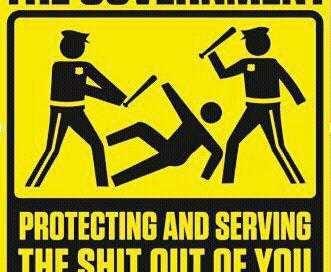During the early days of the internet era, John Barlow published A Declaration of the Independence of Cyberspace, calling on governments around the world to cease their hostile actions against the citizens inhabiting cyberspace. The internet was the wild west back then, so decentralized that early users even allowed themselves some of Barlow’s optimism. However, through whatever mechanism of action, the internet became smaller as large platforms became a dominant force. Over the years, the censor class has gained a foothold and thrived.
Nowadays we have government’s openly conspiring against their citizenry to limit access in a way that would have been hard or impossible to imagine in the wild west days. They no longer are satisfied to just target websites or even individual users. No, now they are concerned with eliminating entire perspectives.
The larger nodes in the centralized internet sphere attempted a similar strategy throughout the pandemic. There were surgical bans of influential skeptics, blanket bans for large skeptic communities, key word bans and misinformation warnings. The quarantine of the skeptics was a test run. While their efforts did not completely eliminate organized resistance, at the very least, they succeeded in ostracizing a forbidden point of view. After mixing in millions of careful curated messages from bots and a media blackout on anything counter-narrative and there was an orgy of government controlled messaging: a censor’s wet dream.
Since the test run was more or less a success, we shouldn’t be surprised that government officials are calling for more. Wise Jacinda Ardern has made her own declaration at the UN General Assembly; let’s call it A Declaration of War against Cyberspace.
Jacinda contextualized her speech by comparing lies to bullets and bombs, and invoked New Zealand’s 2019 terrorist attack as an example of radicalization online. Of course, she wants us all to know that she values free speech and political protest. After all, free speech and political protest is always what the censors want to protect. For our safety, we are asked to ignore the fact that the obtuse end of the political spectrum has an ever-expanding definition of lies — now including anything that they do not agree with — and the radicalized include anyone that espouses anyone that they do not agree with. In short, the contextualization is a moral argument from an immoral person, propaganda in action.
In her words,
“As leaders, we are rightly concerned that even those most light-touch approaches to disinformation could be misinterpreted as being hostile to the values of free speech we value so highly.
But while I cannot tell you today what the answer is to this challenge, I can say with complete certainty that we cannot ignore it. To do so poses an equal threat to the norms we all value.
After all, how do you successfully end a war if people are led to believe the reason for its existence is not only legal but noble? How do you tackle climate change if people do not believe it exists? How do you ensure the human rights of others are upheld, when they are subjected to hateful and dangerous rhetoric and ideology?
The weapons may be different but the goals of those who perpetuate them are often the same. To cause chaos and reduce the ability of others to defend themselves. To disband communities. To collapse the collective strength of countries who work together.
But we have an opportunity here to ensure that these particular weapons of war do not become an established part of warfare.”
It is notable that just a few moments before the quoted text she was citing a terrorist attack as a reason to police the internet. As we can see, that quickly morphed into attacking anyone that questions the latest thing. I would be surprised if a different perspective on the legality of a war or not believing in climate change are views that are against the law in New Zealand, yet those are included on her list of examples. Nor do I have any idea what she means by hateful and dangerous rhetoric and ideology, but I suspect that includes a vast array of people that have dissident viewpoints, few of them harmful to anything but the system itself.
Meanwhile, shortly after Jacinda called the propensity for people to speak freely on the internet a weapon of war, Iran began to disrupt their network in order to quell protests. Meta platforms, such as Instagram and WhatsApp, are actively being blocked in the country due to a government request. Apparently, the Iranian regime and Meta both agree with Jacinda: words on the internet are a weapon of war.
I just can’t for the life of me understand why Jacinda has been so quiet about Iran. She should be pointing to the latest battle in her War on Cyberspace as another glaring example of success. Imagine all the damage those radicalized university students turned soldiers could have caused if left unchecked?





words have always been weapons ... all that WEF crowd ...
california is moving ahead with stopping doctors's free speech ...
Since when do the ramblings of a two-bit dictator from an island country with a population of 5 million prisoners matter on the global stage?